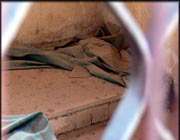Imam Husain"s Revolution: Analytical Review: Part 4
Muawiya"s Reign
The following points are the main features of his rule:
1. Authority: Muawiya assumed authority by sheer force. He did not hide this fact and put it plainly in his address at Kofah. He said, "O people of Kofah, do you think I fought you to establish prayers or giving alms (Zakat) or perform pilgrimage?" He continued, "I know you pray, pay alms, and perform pilgrimage. Indeed, I fought you in order to command you with contempt, and God has given me that against your wishes. You must be certain that whoever has killed any of us, and then he will be killed. And the contract between us of amnesty is under these feet of mine".
2. Terrorism: Muawiya"s rule was terror in the whole Muslim land. This terrorism was spread by sending many convoys in various regions of the country. It was narrated that Muawiya summoned Sufyan ibn Auf AI-Ghamidi, one of his army commanders, and said, "This Army is under your command, proceed along the river Euphrates till Heet. Any resistance in the way should be crushed, and then invade Anbar. After that penetrate deep into Madaain. O Sufyan, these invasions will frighten the Iraqis and please those who like us. Such campaigns would attract frightened people to our side. Kill whoever having different opinions from ours, loot their villages and demolish their houses. Indeed, the War against money is similar to killing but is more painful to their hearts".
Another commander, Basar ibn Artat, was summoned and ordered to proceed towards Hijaz and Yemen. Muawiya instructed him, "Proceed to Madina and expel its people, Meanwhile, people in the way who are not from our camp should be terrorized. When you enter Madina, let it appear as if you are going to kill them. Make it appear that your aim is to exterminate them. Then pardon them. Terrorize the people around Mecca and Madina and scatter them".
3. Islamic Concepts and Laws: During Muawiya"s reign even basic human rights were denied to people. No one is free to express his opinion. Spies were employed to terrorize people, besides the army and police who spared no opportunity to crush people and silence their voices. There are some documents, which reveal Muawiya"s instructions to his governors. For instance, the following letter was addressed to all judges. "Do not accept the witness of Ali"s followers or his descendents in courts". Another letter stated "If you have evidence that some person likes Ali and his family, then omit his name from the rations of Zakat". Another letter continued, "Punish whoever is suspected to follow Ali and bring his house down". Such was the situation of Muawiya"s rule. Historians who were recording these waves of terror described them as unprecedented in history. People were so frightened that they did not mind being called atheists, thieves, but not followers of Imam Ali.
Another facet of Muawiya"s rule was the discrimination between Arabs and non-Arabs. It is an established fact that non-Arabs during Muawiya"s reign were treated as third class citizens. Although they embraced Islam but still had to pay Kharaj and Jizyah! Non-Arab soldiers in the state armies used to fight for bare subsistence level. Once a dispute between an Arab and a non-Arab was presented to a court. The Judge was Abdullah ibn Amir. During the procedure, the non-Arab sadly remarked to his opponent. "May God does not multiply people of your kind" (meaning Arabs). The Arab answered him light heartedly. "O God, increase their population among us"(meaning non-Arabs). People who were present asked the Arab in a state of bewilderment "How do you pray for their increase while he prays for your decease?" The Arab answered, "Yes indeed, they clean our streets, make shoes for our animals, and weave our clothes".
Perhaps the most dangerous mischief, which Muawiya had embarked upon, was the fabrication of Hadiths. When he was facing Imam Ali (p.b.u.h) as an adversary, he found his case a hopeless one. His past was dark and shameful, while that of Imam Ali was glorious and shining. In order to sustain his campaign and boast his followers, Muawiya had to attract some weak character companions, and employed them to fabricate Hadiths. Naturally, his aim was to boast his campaign, challenge adversaries, and legalize his claim to rule. Muawiya"s order was not to let any Hadith or incident in favor of Imam Ali but to fabricate a similar one and attribute it to Uthman, Umar and Abu Bakr. The second phase of this psychological warfare was to put Hadiths in Muawiya"s favor. The third phase was to silence people and keep them calm at what he did whether in wronging Muslims or his violation of Islamic laws.
This trend of fabrication of Hadiths, was constituting a grave danger to the integrity of Islam. Hadith is considered as the second source of Islamic legislation after Quran. Therefore, it was very important to divert this danger. The exposition of this trend to the Muslims at large was very vital. This was done by disgracing those who embarked upon this terrible mischief and nurtured it. Thus, Imam Hussain"s revolution as I can see it.
Few samples of the fabricated Hadiths are the following. Through Abu Hurairah, the Prophet said "God has trusted three for his revelation: myself, Jabriel and Muawiya ". I wonder what God was doing for the revelation when Muawiya was part of the infidel"s camp. Again, Abu Hurairah narrated that the Prophet had given Muawiya an arrow and told him "Take this arrow until we meet in Paradise". What a lucky arrow to enter Paradise. Abdullah ibn Umar claimed that the Prophet said "You will see greed after me, and things which you would disagree with" People asked "O Prophet of God, then what do you order us?" The Prophet said, "Do the governor"s right and ask God for yours". Another fabricated Hadith said to be narrated by Abdullah ibn Umar "Endure what you do not like of your governors, because if you separate from the group (Jamaa) one foot and then died, you would have died as an unbeliever".

These fabricated Hadiths are not only principally contradicting the Quran and other verified Hadiths but are calling Muslims to be slaves of their rulers. This was exactly what the Ummayad"s were aiming at.
4. Appointing Yazid: Muawiya was not ruling as an individual, but was representing a way of thinking different in nature from that of Islam. However, he was not content to leave the ruling stage without making sure that it was properly looked after. His pragmatic and materialistic mind drove him to prepare the crowning of his son, Yazid. Although he made many promises that he would not contemplate installing Yazid. The conditions at the time were not suitable because still there were Muslims who were politically conscious and wanted to see the restoration of Islamic laws and values. Hence, Muawiya had a difficult job to perform before leaving this world. Indeed, he tried his best far buying allegiance to his son of Army commanders, chiefs of tribes and distinguished personalities. But, his efforts failed with many, and he left general instructions of the way to deal with them.
Imam Hasan"s Policy
Wars and internal strife during five long years caused tremendous strain among people. Imam Ali"s speeches at Kofah were manifesting this phenomenon clearly; People were tired of wars, because they were worn out economically. The murder of Imam Ali was disastrous in the political sense. Imam Ali and Muawiya symbolized the apparent dispute between the two parties. The murder of Imam Ali (p.b.u.h.) gave Muawiya a stronger hand in the political field, since his opponent had disappeared from the stage.
Although Imam Hasan assumed power after his father, his authority was not established. Thus, some Iraqi tribes defected to Muawiya"s camp when the latter promised them high donations and animated their hopes of success and good reward. However the scene in Kofah was hopeless, the majority of people were longing for peace. They did not realize at the time the price of peace they were wishing. Nevertheless the political scene required nothing but wise manipulation and patience. The Iraqis and the rest of the Muslim World seemed to be in need of direct experience with the Umayyad rule. Imam Hasan (p.b.u.h.) gave them this chance in order to polarize them permanently against the Umayyads. Besides, in such conditions, the most daring, islamically conscious who would get killed. Imam Hasan wanted to spare such people from being killed and utilize them for a greater task.

The task, which the purity of Islam depended upon, and the existence of Islamic ideals and practices in the society. Those people were entrusted with the propagation of Islamic concepts, unveiling the un-Islamic character of the Umayyads and expose their deviation to the society.
Thus Imam Hasan"s answer to Hijr ibn Uday Al-Kindi came "I found people wishing to reconcile and disliked war. I did not want to go through something, which they disliked. I reconciled especially for the sake of our followers to be spared from being killed. However, I have only postponed the war, and God has a surprise every day".
It is noteworthy that Imam Hasan"s move was politically sound. He actually scored many points against Muawiya in that incident. First, he showed his keen concern for Muslim"s lives and well being. Secondly, he displayed his integrity and disinterest in power if that meant an aim as such. Thirdly, he respected the contract while Muawiya broke it as soon as it was signed. Fourthly, the very conduct of Muawiya"s ruling and his clique exposed the seriousness of his danger and put people in continuous struggle against his power. Thus, Muawiya"s religious mask was stripped off, and at least, responsible people had no doubt about his real character. Therefore the danger of his deeds was partly eliminated.
Pic 1 and 2: Muawiya"s grave
to be continued ...
Other Links:
Martyrdom of Muslim bin Aqeel (A.S)
Umar bin Saad in Krabal Meeting between Habeeb bin Muzhaahir and Meesam-e-Tammar